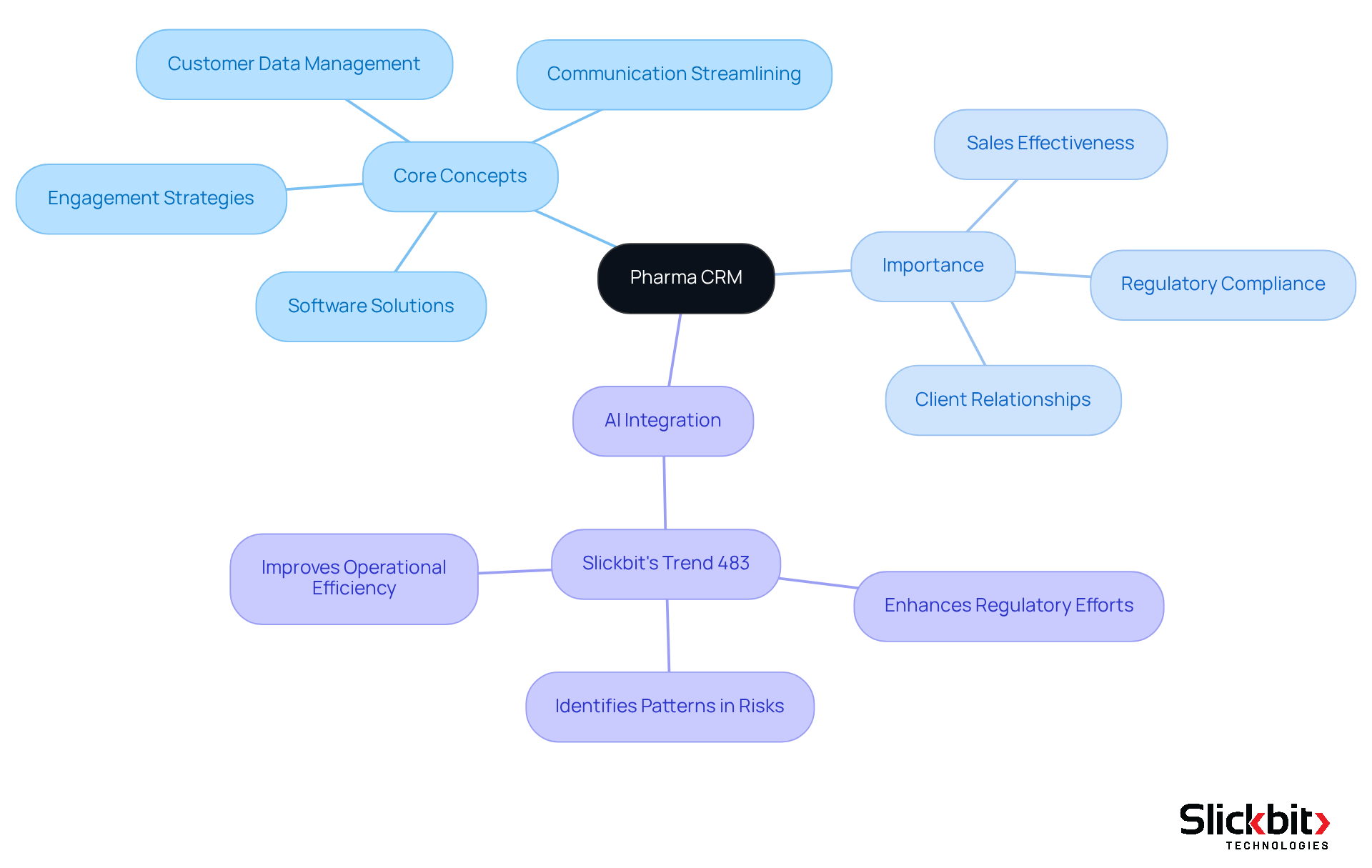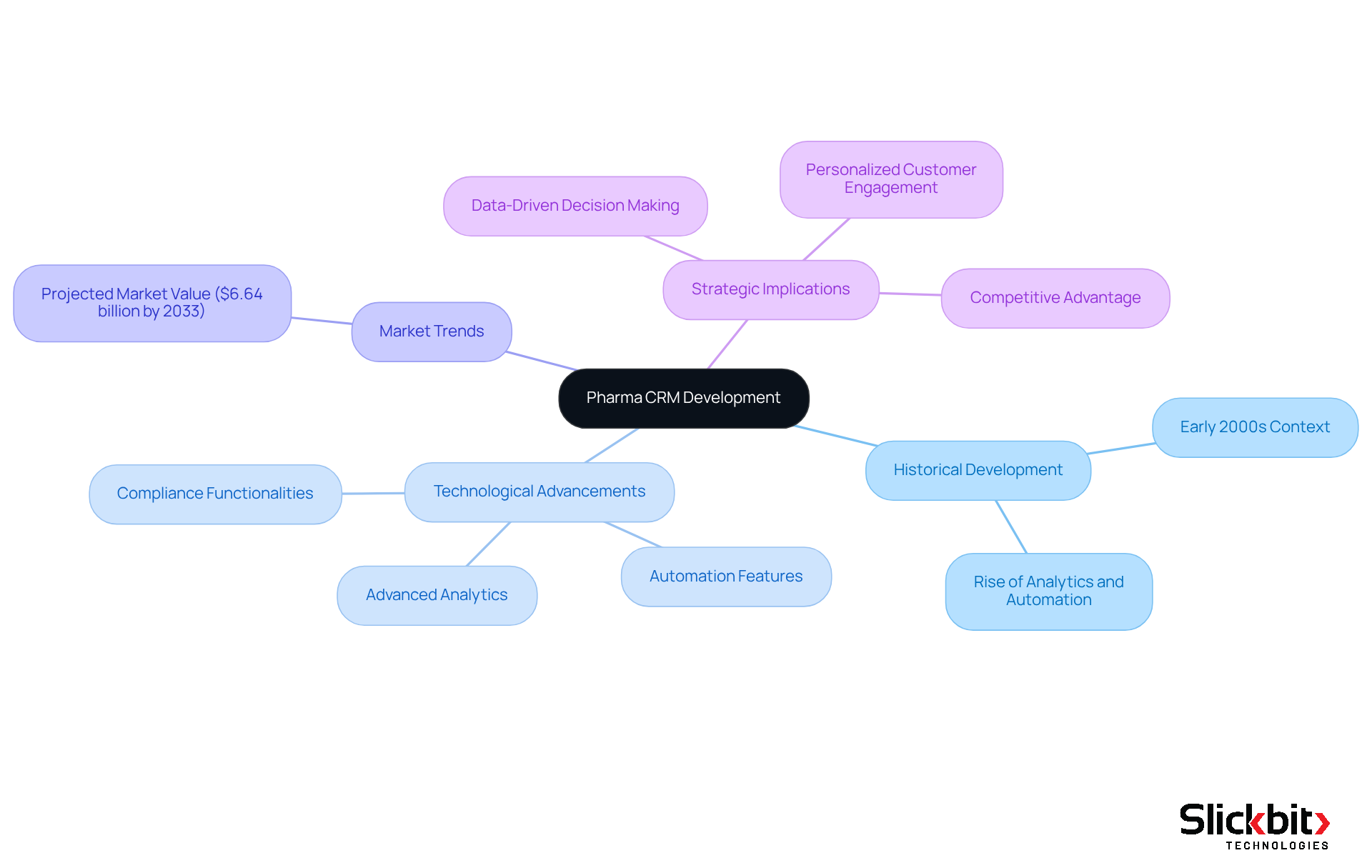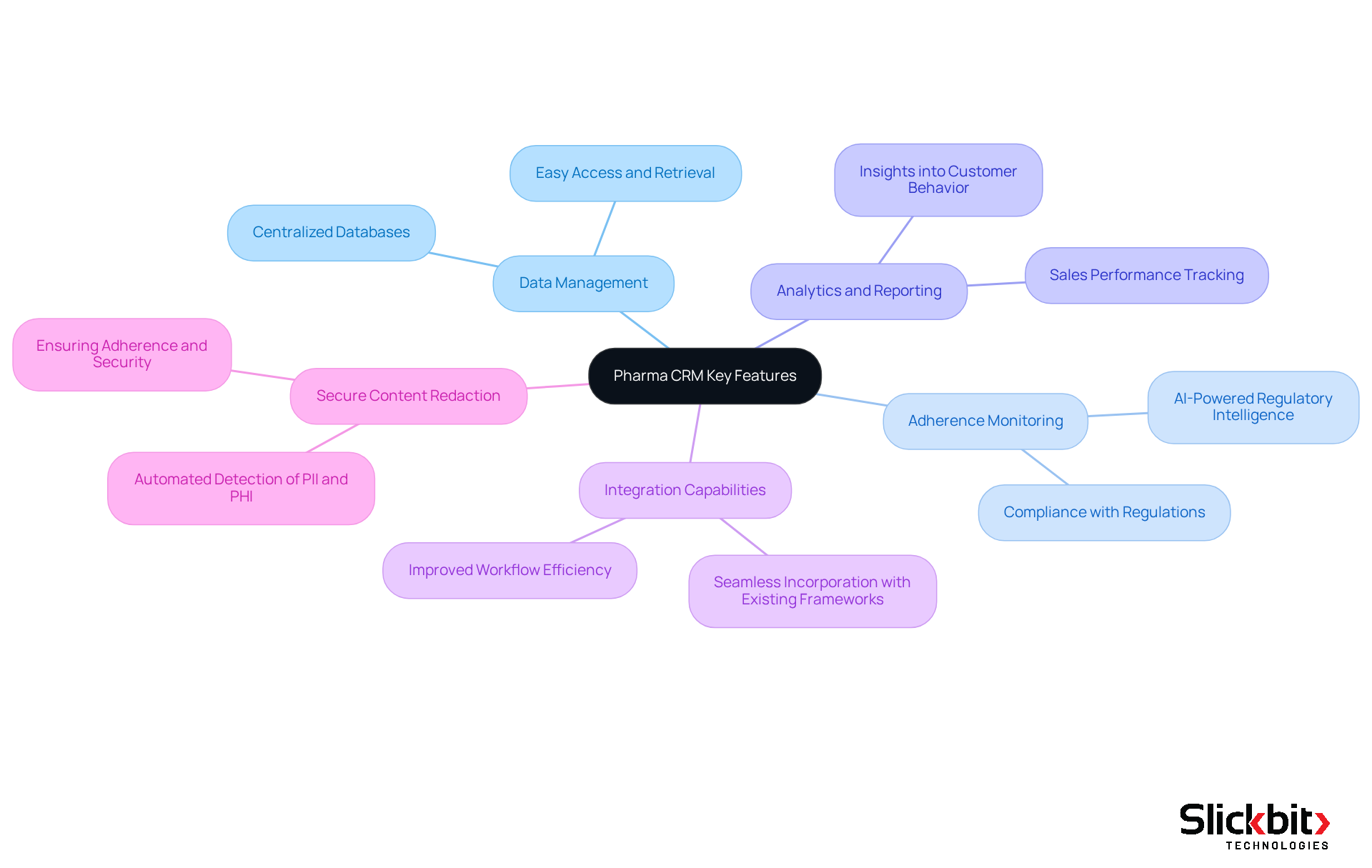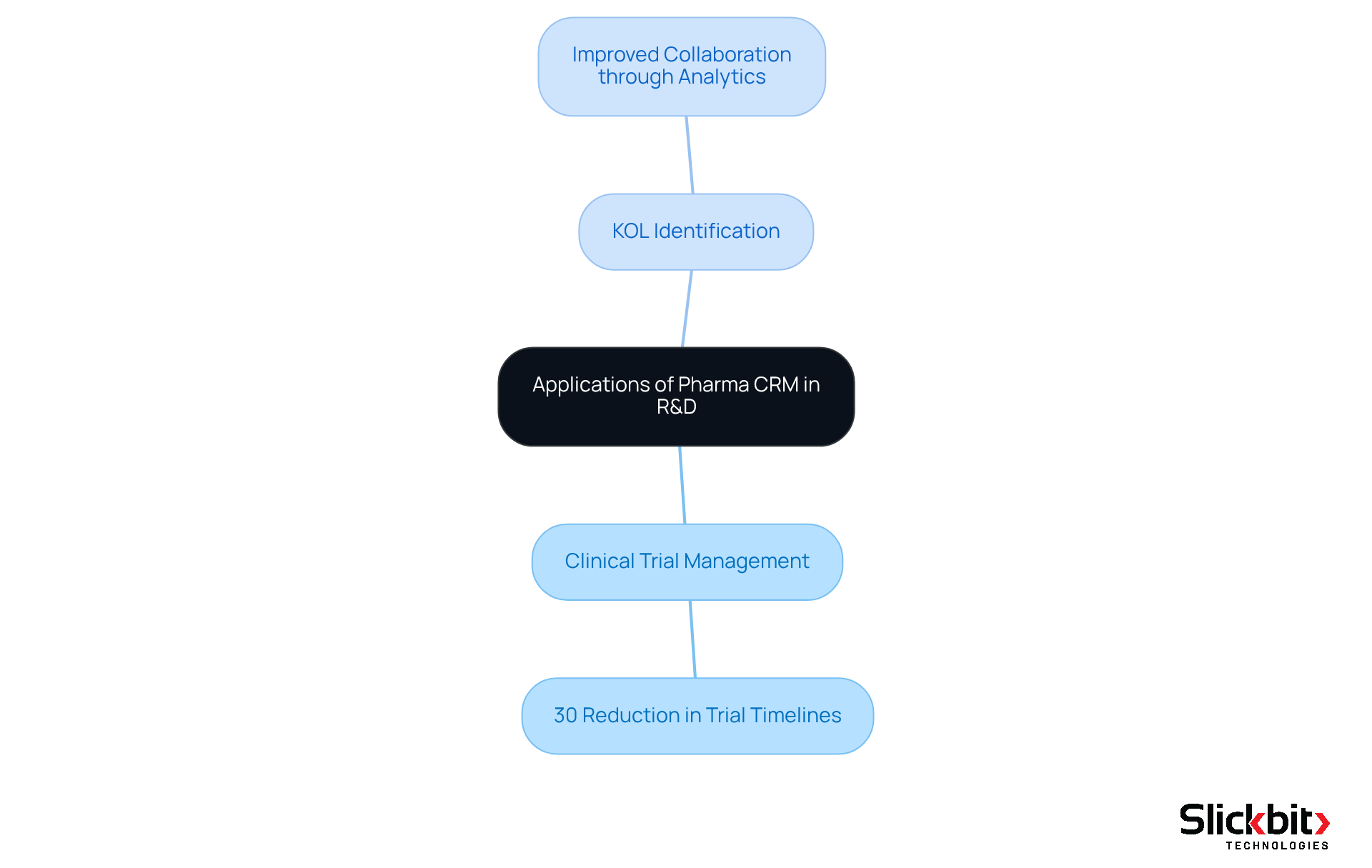Overview
Pharma CRM, or Pharmaceutical Customer Relationship Management, is essential for effectively managing interactions with healthcare professionals and patients. Its role in enhancing sales effectiveness, ensuring compliance, and fostering robust client relationships within the pharmaceutical sector cannot be overstated. Notably, this article emphasizes the importance of Pharma CRM by showcasing features such as:
- Data management
- Adherence monitoring
- Analytics
Collectively, these elements not only boost research and development efficiency but also drive innovation in drug development. Consequently, leveraging Pharma CRM is not merely beneficial; it is imperative for sustained success in the competitive pharmaceutical landscape.
Introduction
In an industry where precision and compliance are paramount, Pharma Customer Relationship Management (CRM) stands out as an essential tool for pharmaceutical professionals. By leveraging specialized software solutions, R&D managers can enhance their interactions with healthcare professionals and patients, ultimately boosting operational efficiency and fostering innovation in drug development. Furthermore, as the landscape shifts with the integration of AI and advanced analytics, a critical question emerges: how can these systems not only fulfill regulatory requirements but also revolutionize the ways pharmaceutical companies engage with their stakeholders?
Define Pharma CRM: Core Concepts and Importance
Pharma CRM, or Pharmaceutical Customer Relationship Management, involves specialized software solutions that focus on managing interactions and relationships with healthcare professionals (HCPs), patients, and other stakeholders within the pharmaceutical sector. These systems are pivotal in organizing customer data, streamlining communication, and enhancing engagement strategies. The significance of pharma CRM lies in its ability to boost sales effectiveness, ensure compliance with regulatory standards, and foster stronger client relationships, ultimately driving business growth and innovation in drug development and commercialization.
Furthermore, the integration of AI tools, such as Slickbit's Trend 483, can significantly enhance regulatory efforts by identifying patterns in systemic risks and recurring infractions from FDA inspections. This incorporation of AI not only improves operational efficiency but also provides deeper insights into regulatory frameworks, thereby positioning pharma CRM as an essential resource for R&D managers navigating the complexities of regulatory requirements.

Contextualize Pharma CRM: Historical Development and Market Trends
The concept of pharma CRM in the pharmaceutical industry started to take shape in the early 2000s, driven by the pressing need for enhanced management of customer interactions and data. As the sector faced increasing regulatory oversight and heightened competition, the evolution of pharma CRM platforms included advanced analytics, automation, and compliance functionalities. Furthermore, recent market trends indicate a significant rise in investment in AI-driven CRM solutions, with the worldwide pharma CRM market projected to reach an impressive $6.64 billion by 2033. This remarkable growth reflects the industry's strategic shift towards data-driven decision-making and personalized customer engagement strategies. Consequently, stakeholders must recognize the importance of adopting these innovative solutions to remain competitive and responsive to market demands.

Identify Key Features of Pharma CRM: Enhancing R&D Efficiency and Compliance
Pharma CRM systems are defined by several key features that significantly enhance operational efficiency. Data Management is paramount; these systems utilize centralized databases for storing and managing customer information, ensuring easy access and retrieval. Furthermore, pharma CRM tools streamline sales processes, facilitating everything from lead generation to tracking interactions with healthcare professionals (HCPs).
Another critical aspect is Adherence Monitoring. These systems incorporate built-in mechanisms to ensure compliance with industry regulations, such as HIPAA and GCP. Enhanced by Slickbit.ai's AI-powered Regulatory Intelligence, they provide accurate, traceable answers derived from FDA and global guidance documents, distinguishing them from standard adherence tracking methods.
In addition, the pharma CRM Analytics and Reporting capabilities offer advanced insights into customer behavior and sales performance, empowering organizations to make data-driven decisions. The integration capabilities of these systems, particularly in pharma CRM, allow for seamless incorporation with existing frameworks and platforms, thereby improving workflow efficiency and data consistency.
Moreover, Secure Content Redaction is achieved through Vault Redact, an AI-driven solution that automates the detection and elimination of Personally Identifiable Information (PII) and Protected Health Information (PHI) from documents, ensuring both adherence and security. Collectively, these features enhance research and development (R&D) efficiency by fostering better collaboration, informed decision-making, and strict adherence to regulatory standards.

Explore Applications of Pharma CRM in R&D: Case Studies and Real-World Impact
Pharma CRM systems have shown their effectiveness in various R&D environments, leading to significant improvements in efficiency and compliance. For instance, a leading pharmaceutical company adopted a CRM system to refine its clinical trial management process. By automating data collection and monitoring interactions with investigators, the organization successfully reduced trial timelines by 30%. Furthermore, a biotech firm utilized CRM analytics to pinpoint key opinion leaders (KOLs) within their therapeutic domain. This strategic approach resulted in more focused engagement tactics and fostered improved collaboration. Such instances underscore the transformative capabilities of pharma CRM in enhancing R&D workflows and boosting overall productivity.

Conclusion
Pharma CRM stands as an indispensable tool within the pharmaceutical industry, dedicated to optimizing relationships and interactions with healthcare professionals, patients, and other stakeholders. This specialized software not only enhances communication and engagement strategies but also drives sales effectiveness, ensures compliance with regulatory standards, and fosters overall business growth. By harnessing advanced technologies like AI, pharma CRM systems empower R&D managers to adeptly navigate the complexities of regulatory requirements while improving operational efficiency.
The discussion highlights several critical aspects of pharma CRM, including its historical development, key features, and real-world applications. Since its inception in the early 2000s, pharma CRM has evolved to address the increasing demands of the industry, culminating in the current trend of AI-driven solutions. Noteworthy features such as data management, adherence monitoring, and analytics capabilities significantly bolster R&D efficiency and compliance, as evidenced by successful case studies that demonstrate reduced trial timelines and enhanced stakeholder engagement.
Ultimately, the importance of pharma CRM transcends mere operational enhancements; it signifies a strategic shift towards data-driven decision-making and personalized customer engagement within the pharmaceutical sector. Stakeholders are urged to embrace these innovative solutions to remain competitive, foster collaboration, and ensure compliance in an ever-evolving landscape. The integration of pharma CRM is not merely a technological upgrade but a crucial step toward advancing research and development in the industry, ultimately leading to improved patient outcomes and groundbreaking drug solutions.
Frequently Asked Questions
What is Pharma CRM?
Pharma CRM, or Pharmaceutical Customer Relationship Management, refers to specialized software solutions designed to manage interactions and relationships with healthcare professionals, patients, and other stakeholders in the pharmaceutical sector.
What are the core functions of Pharma CRM?
The core functions of Pharma CRM include organizing customer data, streamlining communication, and enhancing engagement strategies within the pharmaceutical industry.
Why is Pharma CRM important?
Pharma CRM is important because it boosts sales effectiveness, ensures compliance with regulatory standards, and fosters stronger client relationships, which ultimately drives business growth and innovation in drug development and commercialization.
How does AI integrate with Pharma CRM?
AI tools, such as Slickbit's Trend 483, enhance regulatory efforts within Pharma CRM by identifying patterns in systemic risks and recurring infractions from FDA inspections, improving operational efficiency and providing deeper insights into regulatory frameworks.
Who benefits from using Pharma CRM?
R&D managers and other stakeholders in the pharmaceutical industry benefit from using Pharma CRM as it helps them navigate the complexities of regulatory requirements and improves overall engagement with clients and healthcare professionals.




